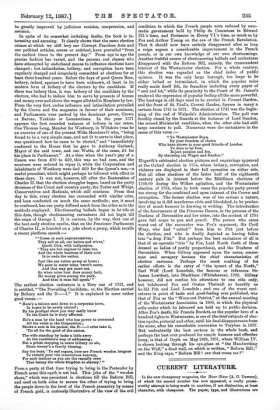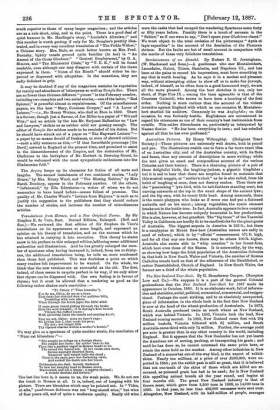CURRENT LITERATURE.
In the new threepenny magazine, the Hour Glass (A. G. Dawson), of which the second number has now appeared, a really praise- worthy attempt is being made to combine, if not distinction, at least character, with cheapness. The paper, type, and illustrations are
mush superior to these of many larger magazines ; and the articles are as a rule short, crisp, and to the point. There is a good deal of quiet humour in Mr. Hardinges story, " Laeinda's Altruism;" and this number is worth getting if only for Mr. Douglas's prettily illus- trated, and in every way excellent translation of " The Fickle Widow," a Chinese story. Mrs. Main, so math better known as Mrs. Fred. Burnaby, lightly treads ground quite familiar (to her) in " An Ascent of the Gross Glookner." " Genteel Employment," by G. A. Simcox, and "The Ministerial Crisis," by "T. E. K.," will be found readable, even although one may disagree with certain of the views expressed in them. "Notes of the Month" should either be im- proved or dispensed with altogether. In the meantime, they are sadly defioient in grip.
It may be doubted if any of the magazines sustains its reputation for variety and abundance of letterpress so well as Temple Bar. There are no fewer than thirteen different" pieces" in the February number, including two complete and two serial stories,—one of the latter, "Bed Spinner," is powerful almost to repulsiveness. Of the miscellaneous papers, we like best "Mary, Countess Cowper," and "A Lover of Leisure,"—i.e., Sir Henry Wetter], who died at Eton in 1639. There ia a flavour, though just a flavour, of Joe Miller in a paper of " Wit and Wits ;" and an article by the late Mr. Serjeant Ballantine on "Law and Lawyers," strikes us as neither solid nor gossipy enough. The editor of Temple Bar seldom needs to be reminded of his duties. Bat he should have struck out of a paper on " The Hayward Letters "- a paper by no means devoid of freshness, or even of shrewd criticism —snob a silly sentence as this,—"If that formidable personage [the Devil] arrived in England at the present time, and promised to audit in the dismemberment of the Empire, and the restoration of Mr. Gladstone to the birthplace of Mr. Herbert in Downing Street, he would be welcomed with the most sympathetic enthusiasm into the Gladatonian fold."
The Argosy keeps tip its character for fiction of all sorts and lengths. The second instalments of two continued stories, "Lady Grace," by Mrs. Henry Wood, and "The Missing Rubies," by Miss Sarah Doudney, appear in the February number. Of the others, " Infatuated," by Ella Edersheim—a writer of whom we do not remember to have heard before—seems fullest of promise. The quality of, Mr. Charles Wood's "Letters from Majorca" is such as to justify the suggestion to the publishers that they should reduce the number of stories, and increase the number of miscellaneous articles.



































 Previous page
Previous page